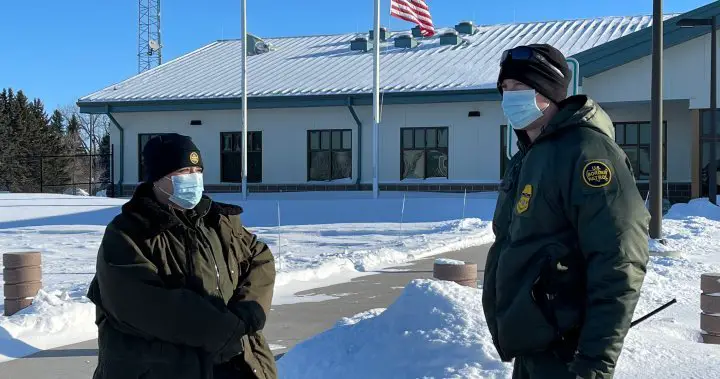Indian law enforcement officials say they are investigating suspected links between dozens of colleges in Canada and two “facilities” in Mumbai accused of illegally ferrying students across the Canada-United States border.
A press release from India’s Enforcement Directorate – a multidisciplinary organization that investigates money laundering and foreign exchange laws – said on Tuesday that a search in several cities had revealed “incriminating” evidence of “human trafficking”.
The allegations have not been tested in court. The federal government, the RCMP and the Indian High Commission in Ottawa, as well as several Canadian higher education officials, did not immediately respond to requests for comment.
The U.S. Embassy said Thursday it had no comment.
Indian officials said they began their investigation after 39-year-old Jagdish Baldevbhai Patel was found dead near a border crossing between Manitoba and the United States on January 19, 2022, along with his wife and two children.
Last month, a Minnesota jury found two men guilty – Steve Shand of Florida and Harshkumar Patel, an Indian citizen arrested in Chicago – on four counts related to importing, transporting and profiting from unauthorized persons into the United States.
Patel is a common name in India and the family was not related to the accused.
Prosecutors said Harshkumar Patel coordinated a sophisticated operation while Shand was the driver. Shand was supposed to pick up 11 Indian migrants on the Minnesota side of the border, prosecutors said. Only seven survived the foot crossing. Canadian authorities found the Patel family dead from the cold later that morning.
Harshkumar Patel and Shand have not yet been convicted and could appeal.
The press release on Tuesday said officials had launched an investigation after a complaint was lodged against Bhavesh Ashokbhai Patel, who allegedly arranged the family’s trip.
The directorate claimed that each family member was charged the equivalent of between $93,000 and $102,000 to enter the United States from Canada.

Get national news daily
Receive the most important news as well as headlines from politics, business and current affairs in your inbox once a day.
The incident was known in India as the Dingucha case, named after the village in Gujarat state in western India where the family came from.
The enforcement agency said it searched eight locations in Mumbai, Nagpur in Maharashtra state and Gandhinagar and Vadodara in Gujarat last week.
It is also alleged that Bhavesh Ashokbhai Patel allegedly arranged for people to get admission into Canadian colleges, which helped them get student visas. The press release did not provide any information about the schools allegedly involved.

“Once the individuals or students reached Canada, they crossed the U.S.-Canada border illegally rather than joining the college and never attended a college in Canada,” it said.
The fee paid for university admission was then refunded, it said.
The search revealed that about 25,000 students were referred to various colleges outside India by one “organization” and over 10,000 students by another each year, the release said.
The network has around 1,700 agents in Gujarat and around 3,500 across India, of which 800 are active, it said.
The press release states that “approximately 112 colleges based in Canada” have entered into an agreement with one company, while “more than 150” colleges have done so with another company.
The press release does not indicate whether universities have connections to both institutions.
Anil Pratham, a former senior police officer in Gujarat who is now retired, was already involved in the investigation of the case in January 2022 when the Patel family died.
He told The Canadian Press his team looked at paperwork, such as certificates and documents, that students use to apply to colleges and universities abroad.
The police then contacted the villagers through various associations and asked them for help.
“We have told the villagers to come out and tell us who are the victims and who are the agents living there,” he said in an interview from Gujarat. “That helped us in our investigation.”
The process took almost three years as the first step is to establish the crime, file charges, investigate the charges and complete the prosecution, he said.
Police in Gujarat have received help from their counterparts in Canada and New York, Pratham said.
He also had advice for those who wanted to go abroad to study or work.
“There is a legal way to travel from India to any country,” he said.
News of the Indian investigation comes amid tensions with the U.S. over border security, a federal government rethink on international student policy and diplomatic tensions with India over alleged attacks on Sikh activists in Canada in New Delhi.
US President-elect Donald Trump has threatened to increase tariffs on Canadian goods if Ottawa does not adequately crack down on migrants and drugs entering the US illegally. This has led Ottawa to allocate $1.3 billion over six years for border security.
Public Security Minister Dominic LeBlanc and Foreign Minister Mélanie Joly traveled to Florida on Thursday to discuss border security and trade with the new US president.
Previously, Canada expelled six Indian diplomats in October over allegations that they used their positions to gather information about Canadians and then passed it on to criminal gangs that directly targeted them.
Canada also claimed at the time that India’s interior minister had ordered intelligence operations against Sikh separatists who advocated carving out an independent country called Khalistan from India. New Delhi rejects Ottawa’s claims.








